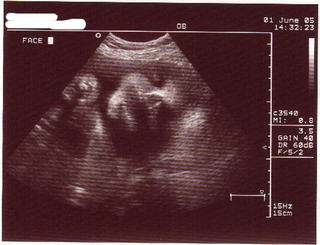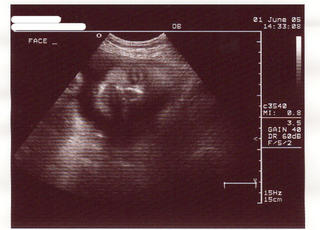This entry is a risky one, since it's only my
intention to exclusively cloth diaper this baby. I've already received a few comments and looks that ultimately imply, "You poor naive thing, thinking you won't use disposables." So let me say at the outset that I realize I may change my tune after the baby comes.
But I really don't think so. My reasons for wanting to cloth diaper are four-fold and impassioned. Here they are:
1. The environment. The usual response to the argument that cloth diapers are better for the environment is, "Yeah, but cloth uses so much water to get clean, I figure it's a toss up."
What people are neglecting to consider are the resources that go into making disposable diapers -- approximately 3.4 billion gallons of oil and 250,000 trees a year. Water is also required in the manufacturing process.
Washing cloth diapers at home, on the other hand, uses the same amount of water as flushing a toilet five or six times a day -- which is how often my child will be going to the bathroom once he's toilet-trained.
But the main problem with disposable diapers is the "disposable" part. They don't biodegrade well, even the ones that claim to, and 3.3 million tons -- 18 billion diapers -- go straight into landfills each year. They are the third largest source of solid waste in our landfills.
And although the packaging on disposables instructs parents to dump fecal matter out of the diapers, I don't know of anyone who actually does this. Thus over 100 intestinal viruses are brought to the landfill where they seep into the groundwater and attract insects which carry and transmit diseases.
2. Cost. It's estimated that disposables cost $1500 to $2500 over the course of diapering a baby. Using cloth can cost as little as $400, depending on what type of diapering system you choose. And as I mentioned earlier, the water it takes to wash them is about the same as what a toilet-trained child would use in flushing.
Yeah, I'm cheap. But in this case the thrifty angle is just a bonus.
3. Health. There are some seriously bad chemicals in disposable diapers. Dioxin, a by-product of the paper-bleaching process, can cause reproductive or developmental defects and cancer.
Also, sodium polyacrylate, the gel that makes disposables so absorbent, is the same substance that was linked to toxic shock syndrome with tampon use. If you wouldn't use it one-fourth of the time near your reproductive organs, why would use it
all the time next to your baby's?
In addition, the perfumes and other chemicals (tolune, xylene, ethylbenzene, styrene, and isopropylbenzene, among others) used in disposables have been linked to asthma. Ever since I switched to all-natural cleaning and beauty products, I've been extra-aware of how perfume-y most mainstream products are. Disposable diapers bowl me over, and that's
before a baby soils them.
Disposables also contain polyethylene and polypropylene, plastics thought to possibly cause cancer in humans. The data on that is limited, but only recently have researchers discovered a link between phthalates, used to make plastics softer and to hold fragrance and color in beauty products, with reproductive abnormalities in baby boys. So I'm not holding my breath that just because something is on the market, it's safe. But maybe if you use disposables you
should be holding your breath.
4. Convenience. Stick with me here. With cloth diapers you don't ever have to run to the store at the last minute when you realize you're almost out. And as those of you with newborns know, there really is no "running to the store."
Also, cloth diapers have come a long way since your grandmother's time. You can still go the inexpensive route and use what are called
prefolds, but now there's a cool product out called a
Snappi that replaces those intimidating pins. Or you could use
fitted diapers, which have stretchy legholes and come with snap closures.
And for covers you're no longer stuck with stiff plastic pull-ons -- they now make pliable covers that
snap or
velcro shut for a custom fit. There are even cute dyed
wool covers that breathe.
If you really want to make things easy, you can use
all-in-one diapers that require no more steps to put on than a disposable.
Pocket diapers are similar, but they have a slot inside where you can add extra inserts according to your absorbancy needs.
So mock me if you must, but I've done my homework. I hope to be washing poopy diapers for years to come.
Sources:
U.S. Food and Drug Administration website
http://www.cfsan.fda.gov/~lrd/dioxinqa.html#g0Children's Health Environmental Coalition:
http://www.checnet.org/healthehouse/education/articles-detail.asp?Main_ID=554Mothering Magazine:
http://www.mothering.com/articles/new_baby/diapers/joy-of-cloth.htmlhttp://www.mothering.com/articles/new_baby/diapers/diaper-asthma.htmlThe Royal Women's Hospital website:
http://www.rwh.org.au/wellwomens/whic.cfm?doc_id=7691

